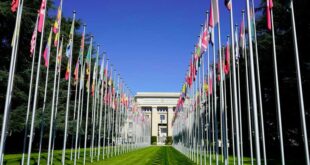CARSTEN FROMM
While Trump is planning to reduce the US military presence in Africa, for example, the members of his own Republican party in the US Senate are opposed to this. Trump’s plans for a withdrawal of troops from Afghanistan are equally deeply disputed even by his own party. At the same time, the establishment of US bases in Libya is being discussed. The opposition to Trump’s withdrawal plans all have the same reasons: the alleged need to “counter Russia”.
Trump’s former confidant, his ex-security advisor John Bolton is also one of the naysayers. In his new scandalous book, he portrays Trump as a fool who is being manipulated by the opponents of the USA, especially Moscow and Beijing.
In foreign policy debates in Washington, the Libyan agenda seems to dominate at present. US strategists are driven by the concern that the important Mediterranean region could be lost – to Russia. This discussion now even has an additional, domestic political component.
A few days ago, on June 17, the US Senate introduced a resolution on the imposition of sanctions against Russian private and military security companies and against Yevgeny Prigozhin, a businessman allegedly associated with them [S.Res.624]. They are suspected by the Americans of having been involved in the conflict in Libya on the side of General Khalifa Haftar. The initiators of the US resolution are Republican Senator Marco Rubio (neo-conservative hawk and a former rival of Trump in the 2016 nomination run-up) and Democrat Chris Coons.
In particular, the accusations against Prigozhin of alleged online operations through the Internet Research Agency (IRA) are a focal point of the resolution. Such allegations already played a major role in the Democrat’s campaign against Trump and the alleged Russian influence on the US presidential elections.
On 11 June, an almost identical US Congress resolution was also passed against the Russian businessman [H.Res.996]. It accuses him of involvement in activities that pose a “threat to the national interests and security of the United States and its allies and partners”.
Both US resolutions list the “crimes” allegedly committed by a Russian national who has maintained close personal ties with Russian President Vladimir Putin since the early 2000s. At the same time, the text of the Senate resolution approvingly quotes John Bolton.
On May 19, the US Department of Justice also published a new version of the Mueller Report – the investigative report on Russia’s alleged interference in the US elections 2016 on the side of Donald Trump. The investigation was concluded more than a year ago. Special Adviser Robert Mueller, after whom the report is named, never found evidence of “collusion” between Russia and Trump. Now, in an increasingly heated US election campaign, pro-Democrat activists from the Electronic Privacy Information Center and “journalists” from BuzzFeed News decided to remind the US public of how the Russians had “interfered” after having obtained a different version of the report by issued by a court.
Prigozhin has since discovered that his name was being used with great enthusiasm in the US establishment’s fight against Trump. In a letter to US congressmen and senators, he accused the US of having hegemonic ambitions and disregard for the national interests of other states. Even for its own people the US establishment shows no respect, Prigozhin said in his letter.
“I am convinced that the American people choose their own presidents. But recently, that choice has not satisfied the corporate elite, the ‘deep state’, noted Prigozhin. “Corporate elites in the United States are trying to establish puppet presidents at the head of state, as the main task of these elites is to steal a trillion from the US budget while promoting their own financial interests abroad, which they call the national interests of the United States”.
According to Prigozhin , who calls himself a “Russian patriot” in this letter, Robert Mueller’s investigation of US President Trump is “one of the most shameful trials in the United States”.
The letter attributes the blame for the cooling of relations between Washington and Moscow to the American establishment. Indeed, President Trump, despite his often belligerent rhetoric, has become an inconvenience to the ‘deep state’, an obstacle to the safeguarding of American hegemony in terms of foreign policy. That is why he is being actively attacked using both the internal issues (civil war, alleged police violence) and the external issue (the Russian factor in Trump’s victory).
In terms of foreign policy, this focus is above all evident in the Libyan theater of war. Trump has never been interested in getting involved in the Libyan conflict. Now they are trying to force him to do so with a double strategy: On the one hand, accusations are being recycled that he will become president in 2016 with “Russian help” – here the establishment is referring to Prigozhin himself – and on the other hand, a “Russian danger” is being conjured up in Libya.
Trump could therefore feel compelled to intervene in Libya. But Prigozhin is certain that this is hardly what the American president’s electorate wants.
 Geostrategic Media Political Commentary, Analysis, Security, Defense
Geostrategic Media Political Commentary, Analysis, Security, Defense





